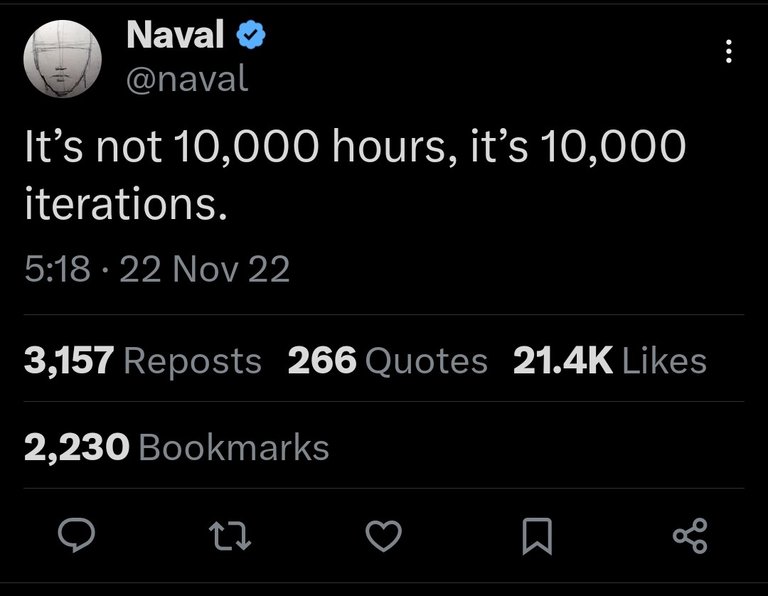10,000 Hours Iterated Upon
Matter of time versus a matter of practice.
Matter of effort versus a matter of deliberate practice.
In some ways, both time and effort are inseparable, given that before performing the latter, the former has to exist already. I think the distinction between them is mostly around intentionality and focus.
Besides and for the most part, if it's just really a matter of time, then it's easier to be patient and wait it out, provided you have the resources to endure.
Effort on the other hand has some qualitative aspect to it. Our efforts aren't always proportional to the results that we get.
Expended effort doesn't always equate with desired results, and vice versa.
I think this disparity is what makes mastery such a personal journey, at least on the path to genuine expertise.
Traditional Outliers
Malcolm Gladwell popularized the concept of the 10,000 hours rule in his book Outliers.
The concept originated from research by psychologist K. Anders Ericsson, who studied expert performers in various fields and came away with the observation that achieving world-class expertise in any skill requires about 10,000 hours of deliberate practice.
Once popularized, the theory has been both influential and controversial.
Some critics do point out that the quality of practice matters more than quantity (i.e., hours put in) and individual differences affect how quickly skills develop (i.e., natural aptitude and learning style).
I personally think this theory is good enough as a baseline awareness and understanding with regards to setting realistic expectations for skill development.
It also dulls the expectation that after a few weeks or months one can be a good pianist or programmer, which clearly doesn't match reality.
Bull's Eye Progress
For modernity's sake, an updated version of this theory has emerged in recent years.
It is 10,000 iterations, which I've read from Naval Ravikant's X posts.
10,000 iterations shifts the focus from time to completed cycles of practice, in the sense that each attempt on practicing a craft creates a feedback loop that compounds your learning.

In a technological age, the iterations concept feels more relevant for adoption.
A programmer who writes and deploys code 10,000 iterations, receiving immediate feedback from users or automated tests, will likely develop proficiency faster than someone who spends 10,000 hours just studying programming without regular implementation.
Bringing it a bit closer to home, content creators on platforms like YouTube or TikTok benefit more from publishing 100 videos and analyzing audience response than spending the equivalent time perfecting a single (or a few sets) video.
Each publication represents an iteration that provides data on what resonates with viewers, which means more publication provides more data to analyze and transform into actionable insights for growth.
The main point is an iterative approach in terms of skill development places emphasis on adaptation and makes the process itself much leaner with few excesses.
Dynamic State Of Life
When you live in a rapidly changing world, the ability to pivot based on real time feedback often matters way more than perfecting a static skill set.
Combining both concepts could look like this: Use the 10,000 hours framework to commit to long-term development, since it's an aspect of mastery that one can't circumvent or shortcut.
Then, structure your practice around maximizing meaningful iterations, which puts the quality of your learning experience at the forefront.
Mastery requires sustained commitment (hours) but optimizing the learning efficiency within those hours by focusing on complete cycles of work (iterations) is where true acceleration happens.
For me, this has influenced becoming more disciplined in terms of each practice session needs to have a full on complete cycle. Like writing a full article instead of trying to trick myself into stretching the research process with little mental bandwidth for actual creation.
Or even just taking less time than necessary to complete a drawing and starting a new one only when the previous drawing is completely done.
Hours provide the container.
Iterations fill that container with actual progress.
And in today's world where we can compress learning cycles like never before, this distinction feels at least important to acknowledge and leverage to our advantage.
At best, it could be a competitive advantage of sorts against this persistent myth that genius is solely innate rather than deliberately cultivated.
Thanks for reading!! Share your thoughts below on the comments.

Thanks for the curation, I very much appreciate it :)